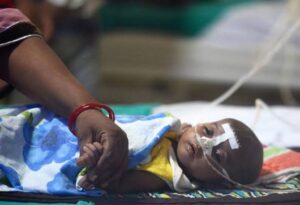
By Mardiya Ahmad Musa
It saddens my heart each time I see a 15-year old boy with lymphatic filariasis (elephantiasis) in the upper limb around ATBUTH Bauchi, begging for alms on the street while his mates are adding value to their lives in school. Unfortunately, this is the reality for many Nigerians living with a group of ailments classified as Neglected Tropical Diseases (NTDs).
These diseases often result in social stigma for those affected. Social stigmatization in extreme cases can lead to impaired mental health, dampen the self-esteem and eventually reduce the economic prospects of such a person.
In a developing nation with over 180 million people, vast with natural resources and an under-developed health sector, NTDs seem to be one of the factors deterring the holistic development of the health sector. Ironically, prevalent diseases like malaria and tuberculosis are still neglected to a large extent, even without being on the traditional list of NTDs.
There is a need for a more rigorous crusade to draw the attention of the health sector and the Nigerian government to these seemingly neglected groups of tropical diseases. Many NTDs such as Guinea worm disease and leprosy have been largely eradicated, however as a result of their underfunding by the government and donor agencies there is a greater risk of their resurgence.
NTDs according to the World Health Organisation (WHO) are a group of 17 diseases common in middle and low-income countries particularly in continents like Asia, the Americas and Africa. These diseases affect children and tend to be caused by Helminthes, viruses, bacteria and protozoa resident in about 149 countries. They affect about 1 billion people worldwide with about 150,000 fatalities recorded annually. These diseases are called NTDs because they are prevalent in low and middle income countries and so receive minimal funding, in contrast to other diseases such as malaria, HIV and tuberculosis. Another reason they are neglected is due to their lower propensity for causing deaths.
However, it is important to note that these NTDs can start off a vicious cycle which can eventually culminate in the death of large populations.
It is noteworthy to state that sub-saharan Africa is a docking site for these diseases because of the intensity of poverty and traditionally dismal approach to standard healthcare practices in the region. These diseases (particularly hookworm infestation) affect about half of the poorest 500 million people in sub-Saharan Africa. Helminthic infections top the list of NTDs in sub-Saharan Africa closely followed by schistosomiasis. The challenge is greater where local primary care facilities are poor. Strengthening local public health systems and supporting community health workers who are the first line of defense in tackling NTDs is therefore critical.
The elimination of NTDs is also inextricably linked to delivery on some of the Sustainable Development Goals (SDGs) such as improving water sanitation and hygiene and reducing malnutrition.
Nigeria is the 7th most populous nation in the world and according to UNICEF, 70% of the population lives on less than a $1 a day. This comes with several challenges as Nigeria is laden with 25% of the burden of NTDs in Africa. Due to the deep-rooted poverty in about 51% of the population, about 10million Nigerians are at risk of contracting NTDs or already have untreated cases of NTDs. A large share of the NTDs recognized by the WHO have their abode in Nigeria. Notable ones include; trachoma, buruli ulcer, Human African trypanosomiasis, Dengue fever, Schistosomiasis, lymphatic filariasis, onchocerciasis and soil transmitted helminthes among others.
The prevalence of NTDs in Nigeria stems from the extreme levels of poverty in the country and this really beggars the question; why must Nigeria care? A rhetorical question of some sort, but the answer is actually not far-fetched. The moment we realize the negative impact of these neglected diseases, we will see the reason we need to care. The economic impact of NTDs cannot be overemphasized, but it is ironic that the economic burden of these diseases is undervalued. The high cost of drugs to treat NTDs also poses a challenge in the elimination of several neglected diseases. Pharmaceutical companies are less likely to commit large funds in the research and development of drugs required to combat NTDs, especially as their target audience is largely poor and unable to afford the high cost of drugs.
A community of people living with leprosy in Minna, Niger state
NTDs have a profound effect on the economy of a country; they have the potential to significantly reduce productivity and increasing the dependency ratio of a country, impeding economic growth.
Research in Kenya showed that mass deworming of persons increased average income by 40%. Each untreated case of trachoma is estimated to cost Nigeria $118million in terms of productivity loss.
Nigeria has the capacity to save $12billion in 19 years (2011-2030) if she meets up with the WHO 2020 target for controlling and eliminating NTDs. As a nation presently in economic recession, the focus should be on prevention which may be more cost effective than treatment.
The need to tackle NTDs has been propelled to the forefront of the global health agenda following the reconvening of key stakeholders in the fight against NTDs at an event hosted by the Bill and Melinda Gates Foundation. The event which concluded in the signing of the Geneva Commitment in April 2017 was a follow-up to the 2012 London Declaration where pharmaceutical companies and donor agencies committed to “controlling or eliminating at least 10 NTDs by 2020”. External donor agencies and pharmaceutical play an essential role in the eradication of NTDs in terms of technical assistance and drug donations. However, there is a need for governments to take on more of the responsibility in providing treatments for individuals with NTDs, the first step however is in developing affordable drugs for many of the neglected diseases.
The repercussions of untreated NTDs are numerous and variable in intensity. Hookworm infestation has been linked with cases of malnutrition among children in Nigeria. Co-infection of NTDs with other prevalent diseases has lethal effects as they have the potential to augment and accentuate the potency of other co-infections. Some of the NTDs, particularly Helminthes infestation diminish the efficacy of the immune system thereby accelerating the progression of HIV and other prevalent diseases in affected generally worsen disease prognosis and severe cases can culminate in death.
Furthermore, the social impact of these diseases should be enough to spur a nation into action. The stigma associated with NTDs is referred to as the hidden burden of NTDs. Diseases like leprosy, lymphatic filariasis, buruli ulcer are all associated with a saddening level of social stigmatization.
The WHO declared that the “last mile is now’. To overcome the last few hurdles in the total elimination of NTDs following significant progress will require the following;
Strengthening public health systems and supporting governments in the elimination of NTDs
Enabling countries with high prevalence rates of NTDs to have access to more affordable drug therapies
limiting the transmission of disease pathogens by effective vector control
Improving diagnostic capabilities and using modern technology where possible
Citizens should have easy access to clean drinking water and sanitation, improved nutrition and hygiene in line with the SDGs
Mass drug administration (e.g administration of Ivermectin to school children)
Handing over greater ownership and responsibility for the eradication of NTDs to governments in endemic countries
Ultimately, not letting the guard down, ensuring continued surveillance and monitoring of NTDs
Following these simple steps can put us in the category of other African countries such as Ghana and Morocco who have eliminated diseases like trachoma in their country.
I look forward to seeing a Nigeria devoid of these debilitating diseases, a free Nigeria. If we care, we can achieve it.
Mardiya Ahmad Musa writes from Mass Communication Department of Abubakar Tatari Ali Polytechnic Bauchi.


